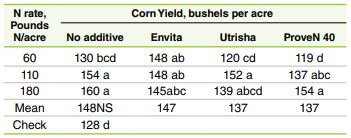Can biological products substitute for fertilizer nutrients?
Growers should be curious but also careful on how these products are tested prior to farm-wide implementation.

Save more dollars and grow more bushels. This simple phrase is a common goal across many farms. The idea of reducing costs and maximizing production is often key to greater profitability. In recent years, higher input costs have tightened farm profit margins. Although fertilizer prices have softened some in 2023, nitrogen (N) fertilizer prices increased nearly 150% in 2022 as compared to 2020. These price increases have been a major factor in lower farm profits leading many farms to look for alternative options to supplement nutrient management. One option is biological products that may contain N-fixing bacteria. These products are marketed to reduce supplemental fertilizer N by a certain percentage or quantity depending on the cropping system.
Biological products with asymbiotic N-fixing bacteria claim to fix N in similar fashion as symbiotic Rhizobia in legumes. Products operate by infecting the seed or the soil adjacent to plant roots and fix N from the air. In soil, these bacteria receive energy from root exudates including organic matter or residue decay compounds. In the plant, these organisms receive energy from within the plant in which they reside. Products containing asymbiotic bacteria are one of the latest marketing trends to enhance crop production. Some products claim replacement values of up to 50 pounds of applied N per acre. In 2022 when nitrogen reached prices of $1 per pound, cost savings would have been up to $50 per acre. At current 2023 pricing, $35 per acre would be a potential savings target.
With the potential for cost savings, universities across the North Central Region sought to determine the value these products may bring to growers. Tests focused on a broad array of biological products, with 61 site-years of testing completed in 2022 alone. Application methods included in-furrow, foliar spray, and seed treatments. Michigan State University was one participating university conducting research on corn in 2022.

Treatments included multiple N rates with and without asymbiotic N-fixing products including Envita, Utrisha, and ProveN 40. Each trial received a base rate of 60 pounds N per acre applied in a 2-inch by 2-inch subsurface band placement at planting. The 110 pounds N per acre treatments received an additional 50 pounds N per acre side dress application at V3-V4 using coulter injection of 28-0-0 (UAN). The 180 pounds N per acre treatment received a 120 pounds N/acre side-dress application at V3-V4 using coulter injected UAN. A check plot with no N fertilizer application was also included for comparison.
Total N application rates were 60, 110, and 180 pounds N per acre. Envita was applied in-furrow at planting at 3.2 ounces per acre; ProveN 40 was applied in-furrow at 12 ounces per acre; Utrisha was applied as a foliar application at V4-V8 at 5 ounces per acre. There was no yield improvement (P<0.05) with the use of Envita, Utrisha, or ProveN 40 over N rates alone (Table 1).
Trials on corn, spring wheat, sugar beets, and canola were conducted across the upper Midwest at other universities. Results from these studies are collected in a new bulletin available here: Performance of selected commercially available asymbiotic N-fixing products in the North Central Region.
Across the compiled studies, 59 of the 61 site-years demonstrated no yield increase with the biological product over the N rate individually. Asymbiotic N-fixing bacteria already exist in many soils with activity levels increasing as tillage decreases and under moist, warm conditions. Activity levels decrease in dry, wet, or cold soils and under high concentrations of residual inorganic N.
With limited positive results, farms should be cautious about widespread use of biological products. Individual testing of products across replicated strips and multiple N rates is encouraged. Growers need to be sure that N rates tested are NOT all greater than recommended N rates. Farms should continue to seek unbiased data on products and performance before decreasing fertilizer rates across whole fields.



 Print
Print Email
Email